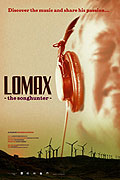
Inhalte(1)
Alan Lomax (1915-2002) earned a singular place for himself in American culture and arts. Building on the pioneering work of his father, John, whom he accompanied on folk-song recording tours of the American South and Southwest in the 1930s and '40s, Alan set out after World War II to do nothing less than draw the folk music map of the world. Sensing that the world's indigenous music was on the point of being swept away by mass commercial culture, Lomax brought considerable energy and urgency to his awesome task. He also brought an infectious love for the varied homespun musical traditions, especially the songs passed mouth to ear for generations.
When Dutch filmmaker Rogier Kappers set out to make a documentary about Lomax in 2001, he found the once-tireless traveler and talker, having suffered a stroke, in the care of his daughter, Anna, in Florida. Lomax, 86, could no longer make himself understood, though he was delighted to hear his recordings and essays. Kappers had access to experts, friends, and archival footage and recordings. But wanting something essential that might have come from Lomax's own recollections, Kappers decided to add a more offbeat tactic. He retraced some of Lomax's journeys to remote places in pursuit of the vanishing folk song and he found living testimony to the lasting impression Lomax and his bulky tape recorder made some 60 years earlier. Lomax died on July 19, 2002.
Being the son of the man who discovered Leadbelly (in fact, got him out of jail) and who helped introduce Woody Guthrie to the American public might have daunted most men. But Alan Lomax, born in Austin, Texas, inherited his father's determination as well as his passion for folk songs. He joined his father on tours of cotton fields in the South, rock quarries in Oregon and prisons in Louisiana and Texas, where they recorded and wrote down for the first time such American classics as Rock Island Line, John Henry, Home on the Range, and Swing Low, Sweet Chariot. These songs were, as Lomax says in archival footage, simply the most beautiful music he'd ever heard. His quest eventually led him to towns and villages in Scotland, Spain and Italy to discover and preserve the folk songs of those regions.
For the Lomaxes the music was beautiful because it was created by ordinary people as part of their everyday lives - songs sung to make the work go smoothly, to entertain one another, to preserve stories, to pass on news, to express popular opinions. Folk music recorded their history and feelings in highly localized, popular language in stark contrast to the pop music made by professionals for mass consumption. It was the shared genius of father and son to use the very instrument, the tape recorder only 50 years old when John Lomax started his work to preserve the old musical life that the new recording industry was wiping out.
Lomax the Songhunter includes interviews with Alan Lomax's friends and colleagues, among them renowned banjo-picker and singer Pete Seeger, who catalogued records for him; Pete's half-sister, singer and activist Peggy Seeger; British folksinger and writer Shirley Collins; and Jean Ritchie, who landed in New York fresh from Kentucky in 1947 and was promptly drafted into recording her family's entire repertoire of folk songs for the Lomax Archive at the Library of Congress. Lomax associates and collaborators such as Peter Kennedy, one of England's leading folklorists; world-renowned ethnomusicologist Henrietta Yurchenco; and Vittorio de Seta, who met Lomax in Italy testify to his intensity, ego, energy and engaging ability to get often-suspicious people to sing into his recorder.
(Verleiher-Text)